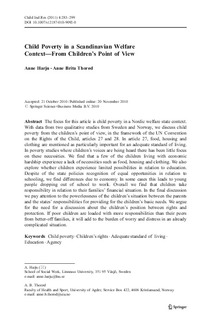Child poverty in a Scandinavian welfare context - from children's point of view
Original version
Harju, A., & Thorod, A. B. (2011). Child poverty in a Scandinavian welfare context - from children's point of view. Child Indicators Research, 4(2), 283-299. doi: 10.1007/s12187-010-9092-0Abstract
The focus for this article is child poverty in a Nordic welfare state context. With data from two qualitative studies from Sweden and Norway, we discuss child poverty from the children's point of view, in the framework of the UN Convention on the Rights of the Child, articles 27 and 28. In article 27, food, housing and clothing are mentioned as particularly important for an adequate standard of living. In poverty studies where children's voices are being heard there has been little focus on these necessities. We find that a few of the children living with economic hardship experience a lack of necessities such as food, housing and clothing. We also explore whether children experience limited possibilities in relation to education. Despite of the state policies recognition of equal opportunities in relation to schooling, we find differences due to economy. In some cases this leads to young people dropping out of school to work. Overall we find that children take responsibility in relation to their families' financial situation. In the final discussion we pay attention to the powerlessness of the children's situation between the parents and the states' responsibilities for providing for the children's basic needs. We argue for the need for a discussion about the children's position between rights and protection. If poor children are loaded with more responsibilities than their peers from better-off families, it will add to the burden of worry and distress in an already complicated situation.
Description
Published version of an article published in the journal: Child Indicators Research. Also available from the publisher at: http;//dx.doi.org/10.1007/s12187-010-9092-0
